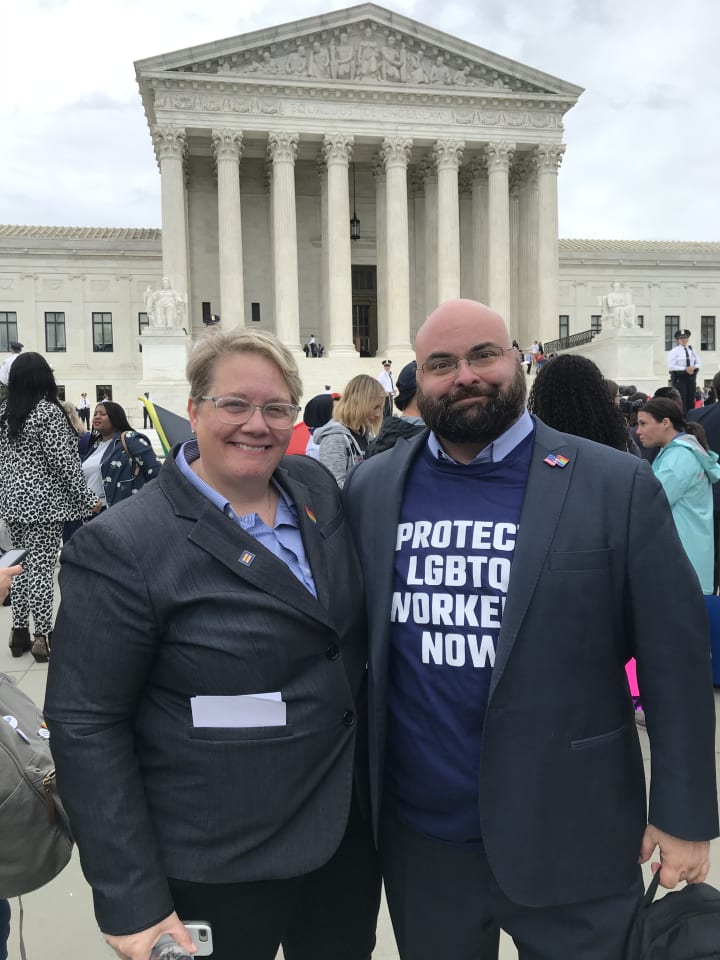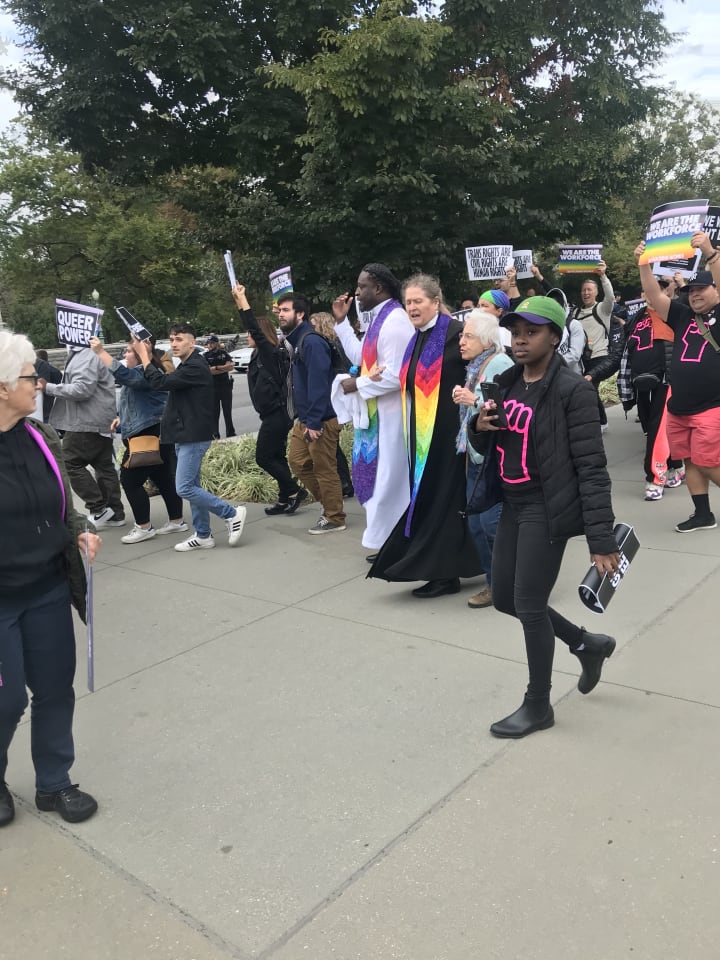The Equality Fight Continues and Is More Important than Ever
The Supreme Court is expected to rule on whether employers have the right to fire employees based on their sexual orientation and gender identity

May 17 is International Day Against Homophobia, Transphobia and Biphobia.
SPOILER: Opinions ahead
“I’d like to live to be old.” — Bren Osborn
In October of last year, the Supreme Court heard oral arguments in three cases that will determine whether it is legal for a company to fire a worker solely based on sexual orientation and/or gender. Bluntly, the Court’s decision will decide whether workplace discrimination against the LGBTQIA community is legal. A decision in the cases is expected by late June, just before the court’s summer recess.
I was outside the court building that day in October, witnessing the demonstrations and interviewing participants. But I’ve been sitting on the story ever since. Honestly, I wasn’t sure how to write it correctly, to give it due justice, and I was afraid. I was trying to be objective, keep myself out of it so that I could let the participants’ stories speak for themselves. I was wrong to do that. This is fundamentally subjective. The arguments are posed as legal questions, but are based in emotion, not the flat objectivity expected of the law.
I am not LGBTQIA, but I am an ally. I want to be clear about something. I want you, the reader, to unequivocally understand that I have chosen a side. And, while a big part of my feelings about the LGBTQIA community are just that, feelings, there is another, much more objective side.
I was taught to “pick a side” and defend it. My reasoning here is easy: it’s the human condition. If I am a thoughtful member of society, looking at this with “open minds, clear hearts” (thanks to Friday Night Lights for the expression), I should be on the side of non-discrimination. I don’t have any family members, that I’m aware of, that are part of the LGBTQIA community. I have friends that are, but that shouldn’t matter. What matters is that we treat everyone equally and that we all endeavor to understand that we are fundamentally still the same, no matter what we look like or who we love. I’ve given a lot of thought as to why I feel the way I do. I’ve discovered that all of my reasons boil down to one simple idea, the most basic idea, “Do unto to others as you would have them do unto you.” The Golden Rule, in one form or another, exists in almost every religion. According to the Bible, Jesus of Nazareth said it was the second greatest commandment (Mark 12:31). I think of how I hope my parents would treat me and how I hope to respond as a parent if one of my children comes out to us.
This trifecta of cases revolves around R.G. & G.R. Harris Funeral Homes v. EEOC (Aimee Stephens), Altitude Express v. Zarda (Donald Zarda) and Bostock v. Clayton County, Georgia. The first case involves Aimee Stephens, a woman fired from her job for being transgender. The next two (which have since been consolidated into one case), involve people being fired from their jobs because of their sexual orientation.
In 1964, the Civil Rights Act was passed. Our country decided that people could not be discriminated against on the basis of skin color. We cannot deny someone a home, a bank account, a car, a job, even groceries based on their skin color or religion. This is no different. Fear of something, or a lack of understanding, does not give us the right to discriminate. Just because there are some who fear homosexuals or transgendered people does not mean we get to discriminate against them. They are people, just like you and me. But, in our country, discrimination is a crime. And, this is discrimination. Homophobia and transphobia does not give us the right to deny their ability to care for themselves and their families. It does not give us the right to tell them that they aren’t allowed to exist in public. Your discomfort does not trump their right to life.
Unpacking the Cases¹
There are two main arguments being discussed in these cases. The first argument is whether discrimination based on sexual orientation or gender orientation is a violation of Title VII, which makes it illegal to discriminate against someone on the basis of sex. The justices had some interesting questions for the attorneys. In the case of the man who was fired for being gay, they posited that this may fall under Title VII because if it were a woman who preferred men she would not be fired, thus “on the basis of sex” would be in effect. As for the transgender woman, the argument is that it is discrimination “on the basis of sex” because if the woman had been assigned a female gender at birth, she would not be fired or denied promotions for being insufficiently feminine. But, because the transgender woman was assigned a male gender at birth, despite now being a female, she is being discriminated against for being insufficiently masculine.
The second argument is whether forcing someone to hire a homosexual or transgendered person would violate the employer’s First Amendment right to freedom of religion. The businesses involved in these cases are not churches, temples, synagogues or mosques. They are not even explicitly religious businesses. I am of the belief that the right to do something exists only insofar as it does not infringe upon someone else’s safety. Allowing this kind of discrimination in the name of religious freedom does infringe on others’ safety. If homosexuals and transgendered people are not allowed to hold jobs without fear or worry that they could be fired at any moment, it creates major instability in their lives. Employment and money are necessities. A person’s religious beliefs should not give employers the right to discriminate against someone who doesn’t share their beliefs. Those same arguments were used when our country allowed discrimination on the basis of skin color and religion. They were deemed invalid then, and they should be deemed invalid now.
Life, liberty and the pursuit of happiness. That’s what our founding documents say. Those same documents also showed us that our Founding Fathers thought African-Americans were only three-fifths of a person and were actually chattel, not human beings. Our country has, ostensibly, evolved into a better understanding that the founding fathers were wrong, slavery was an abomination, and that African-Americans, and other people of color, are no different than Caucasians. The same can be said about the gay and trans community. They have lives and relationships and jobs and stories. Please read their words. Read with an open mind and an open heart. Please understand that the outcome of these cases will literally affect their entire lives, their entire existence. If we have all agreed that discriminating on the basis of skin color is unacceptable and illegal, we should all agree that this is illegal too. Discrimination, in any form, is wrong.
Their Stories, Their Words
The quote at the top of this piece is the cornerstone of all of this. People want to be able to live their lives and not fear an early death. That’s a reasonable request. But, let’s discuss it for a moment.
The first case mentioned above is about a transgender woman who was fired because of her gender identity. While the oft-cited statistic that the average life expectancy of a transgender, African-American woman in the U.S. is 35, is incorrect, the life expectancy of the transgender community is still significantly lower than that of cisgender community. In 2017, 29 transgender persons died due to fatal violence, the most ever recorded. The number went down to 26 in 2018 and 25 died as a result of fatal violence in 2019. Yes, the numbers are decreasing, but they’re still far too high. And, black trans women are disproportionately affected by this violence. —Statistics provided by the Human Rights Campaign Violence Against the Transgender Community in 2019 .

I spoke with Ms. JoDee Winterhof, Senior Vice-President of Public Policy and Political Affairs for the Human Rights Campaign (HRC) and Mr. Masen Davis, CEO of Freedom for All Americans to get their perspectives on this issue.
“This is important because discrimination actually happens,” Ms. Winterhof said. "These three cases show that. If someone faces discrimination just to have a job, how can they live their lives? It is already illegal to discriminate against people for their sexual orientation and gender identity in the banking and housing sectors. These jobs are a part of that as well. It should be illegal to fire someone because of sexual orientation and gender identity.”
“As a gay man and transgender man who came out 20 years ago when there were almost no protections, these cases are the most pivotal for me, in my life, and for the LGBTQ people who live in the 30 states where protections don’t exist,” Mr. Davis said. “They deserve to take care of themselves and their families and it is not so easy.” He also said, “It is personal. I want to make sure that young gay, and trans, kids in Missouri (Mr. Davis’s birthplace) don’t feel like they have to move away to be themselves or love who they love.”

The story told to me by Carmen Guzmán was chilling and heartbreaking. She wrote, “I was thrown down the stairs in high school just because people thought I was queer. Later, I was disowned by my adoptive parents because I became fully actualized. Equal=equal.”
Her wife, Ikeita Cantú said, “We are all God’s children. Every human being has inherent dignity and value and is worthy of respect. No one deserves to be treated like a second-class citizen. All we want is equality — nothing more, nothing less.”
Ms. Guzmán and Ms. Cantú were celebrating their 10th wedding anniversary. Ten years ago, there was no federal right allowing gay marriage. That decision wasn’t handed down by the Supreme Court until 2015. And even after it was decided, at least one state attempted to circumvent the law by closing marriage license offices and refusing to issue marriage licenses to any couples, gay or straight.
The message from all of these people is the same at its heart. Please remember that they are human beings, just like everyone else. They do not want to go to work each day worried that they might be fired simply because of who they are or who they love.
Then there are the messages from people who asked not to be photographed, but agreed to be quoted.
“Separating our lives isn’t possible for us. It’s not politics, it’s our lives and I want to fight for it.” — Katie Marrinan
“I am here today for freedom for all Americans. Queer rights are human rights.” — Darnell Smith
Or messages from those who asked to remain anonymous.
“Equality. Protecting people’s rights. The rights of all citizens of our country.”
“Everyone should have the right to work or make a living without discrimination. All genders, all people are important.”

Religious leaders demonstrated as well. These two, an African-American man and a white woman, led a group of demonstrators in the chant: “No fear! No hate! No license to discriminate!” Their group organized a sit-in, blocking 1st Street, NE between the U.S. Supreme Court and the U.S. Capitol.
Others came from out of town because they felt it was too important to stay home and hope for the best.

Jevon Martin is the Founder and CEO of Princess Janae Place, Inc., a homeless shelter and safe space in New York City, for those in the transgender, non-conforming community. He founded Princess Janae Place in 2015 after an increase in the city’s homeless population. Mr. Martin, and others, came by bus to be at the demonstration. He wrote, “This is important for us to be here because our rights matter. We have been fighting this fight for many years. These are basic human rights. We deserve to live freely, to be who we are.”
Marquise Vilson, an actor and friend of Mr. Martin, also attended. He said: “Our lives depend on it, being here, speaking up, being seen. We cannot be erased. It’s time for this country to acknowledge that queer+ communities are human beings and deserve civil rights.”
These are real people. They have real lives and this decision will affect those lives. Their lives and livelihoods will be in jeopardy. Because, while the protections exist in other sectors like banking or housing, if they cannot continue to work without fear of being fired, the other things don’t matter. They cannot maintain bank accounts or pay rent or mortgages without jobs. It will affect their mental health. Imagine having to hide who you are, every moment of every day, just so you can keep, or get, a job. Imagine the fear and the worry.
Now, realize that the people I spoke to, and many others like them, don’t have to imagine it. They live it. The LGBTQIA community deserves equal rights. They deserve to live without fear. We are all human beings and we all deserve love and respect.
Discrimination should never be tolerated, and it is incumbent on all of us to make sure it isn’t.
¹ Information regarding the arguments was sourced from scotusblog.com.
Katy Ferry is a writer and former expatriate. She’s a Southerner living in Washington, DC with a husband, two daughters and an old fat basset hound. Katy can be found on Twitter, Instagram and her very in-progress website, katyferrywrites.com. This article also appears on her website and medium.com. Click here to subscribe to her newsletter.
About the Creator
Katherine Ferry
Katy Ferry is a writer and former expatriate. She’s a Southerner living in Washington, DC with a husband, two daughters and an old fat basset hound. Katy can be found on Twitter, Instagram and her in-progress website, katyferrywrites.com.






Comments
There are no comments for this story
Be the first to respond and start the conversation.